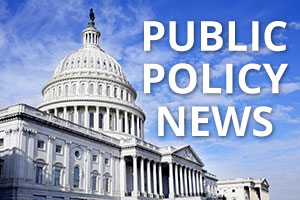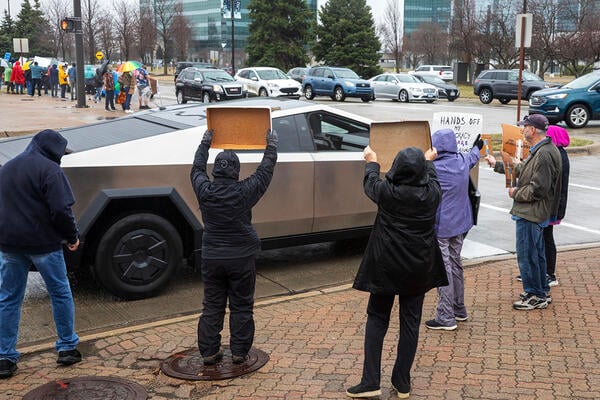NATIONAL HARBOR, Md.—Just outside of Washington, D.C., across the Potomac River, Capitol Hill cast a shadow over the annual meeting of the National Association of College and University Business Officers, where concerns over federal funding and policy changes were palpable among attendees.
At panels and in side conversations during the three-day meeting, held at the sprawling Gaylord National Resort and Convention Center, attendees swapped strategies, drilled into pressing issues and commiserated over pressures on the sector wrought by both the political environment and a business model that is strained in many places. Representatives of a diverse mix of institutions from across the nation attended, but common challenges emerged: They worry about the impact of looming federal policy changes, which they expect to add pressure to institutions already grappling with financial challenges related to enrollment declines, high tuition discount rates and other issues.
Here’s a recap of themes and moments that emerged from the conference.
‘Fear, Anxiety and Contempt’
At a packed panel covering recent activity out of Washington, NACUBO vice president for policy and research Liz Clark noted the strains business officers are feeling amid a “tumultuous year” marked by a flurry of federal actions, including the passage of the so-called One Big Beautiful Bill Act, pushed by President Donald Trump, which included various provisions for higher education.
The legislation, signed earlier this month, caps some student loans while eliminating the Grad PLUS program, limits repayment options and requires programs to pass an earnings test for attendees to access federal student loans, among other provisions, including changes to the endowment tax. Passed on a partisan line with Republicans under pressure to deliver Trump’s signature legislation, Clark noted it is just one action—albeit a significant one—that has reshaped higher education this year.
Clark added that 2025 has “brought a lot of fear, anxiety and contempt” as colleges navigate restrictions on diversity, equity and inclusion programs; cancellation of federal grants and contracts; and various state laws that have “created a challenging environment” for the sector.
“I feel like we have, this year, been dealing with everything, everywhere, all at once,” Clark said.
Clark noted that despite the concerns she highlighted, the One Big Beautiful Bill Act, which she abbreviated “Bubba,” and other policies that were proposed could have hit higher education much harder. One example she offered was the endowment tax, which in the final bill fell far short of what House Republicans initially proposed.
But in another panel on tax reform, Clark suggested that the endowment tax could still be revised in ways that resemble earlier proposals and would have affected more universities and at higher rates.
“Don’t forget that ideas never die in Washington,” Clark warned.
Legal Perspectives
A panel of higher education lawyers also weighed in on current challenges for the sector.
Kate Hudson, deputy vice president and counsel for government relations and public policy at the Association of American Universities, warned at the start that the session would not have “a whole lot of good news.” Given the rapid pace of changes from the federal government, she also offered a caveat: “Anything I say today could be out of date in 72 hours.”
Hudson noted that campus attorneys are dealing with multiple actions from the federal government, such as federal funding freezes and far-reaching executive orders, as the Trump administration seeks to reshape everything from academic research to college admissions.
“I don’t think it is too dramatic to say that this is a wholesale renegotiation by force of the government-academia partnership,” Hudson said. “I don’t think that’s an overstatement.”
Jen Gartner, deputy general counsel at the University of Maryland, argued that the relationship between the federal government and research institutions shifted from “extremely collaborative and collegial” to a suddenly “adversarial approach” that has left universities flummoxed. That strain has particularly been felt around grants, which she said have often been terminated for unclear reasons. She also said the federal government has provided unclear information on such cancellations, sometimes providing contradictory statements in the same termination notice.
And as higher education attorneys have sought answers, she said, they’ve reviewed few.
“It’s not just that universities don’t know what to do—agencies don’t know what to do, either, and [staff are] not picking up the phone or responding to emails if they’re even still there,” Gartner said.
Related to research, Hudson also warned that Trump administration’s scrutiny of international students, which includes now vetting their social media posts for evidence of hostility toward the U.S. government and culture, also has the potential to harm the sector.
“It’s not an overestimation to say that threats … to legal immigration, to your campuses, do present an existential threat to the academic research enterprise itself at a time when [research and development] budgets and graduates from STEM degrees in our competitors, such as China, are off the charts and reaching new heights,” she said. “International students will go elsewhere.”
Hudson added that the AAU has not historically focused on immigration law, but that has suddenly shifted amid the threats to international students and faculty.
A Hard Year Ahead?
Inside Higher Ed also hosted a panel at this year’s conference to discuss the results of the 15th annual Survey of College and University Chief Business Officers, released last week. That survey, conducted in partnership with Hanover Research, found college business officers confident in the long-term outlook but worried about their financial situation in the near future.
Most respondents believe their institutions will be in worse financial shape next year. Only 43 percent expressed the belief that their institution would be in better shape next year. But Rick Mills, president and CEO of United Educators, was skeptical about the sentiment that financial situations will improve by next year given the various challenges discussed at the conference.
“At one level, I take heart in the optimism,” Mills remarked. “I think it’s what keeps all of us going, and what gets you to work in the morning, and perhaps, in the end, helps us solve the problem. On the other hand, it strikes me as slightly fantastical thinking in the current environment.”




